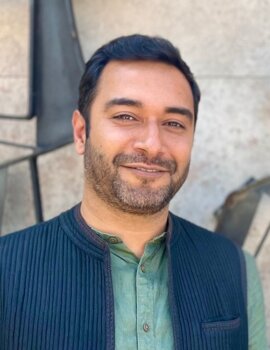Sign up for this session

This session explores the intricate relationship between authoritarianism, colonial legacies, and the quest for emancipatory futures within the global order. Far from being isolated phenomena, authoritarian regimes are embedded in the very fabric of global governance, rooted in enduring colonial structures, racialized hierarchies, and extractivist logics that continue to shape international and domestic politics across the Global North and South. These colonial continuities manifest in various forms, from structural violence and institutional repression to the deployment of populist and nationalist narratives that challenge Western dominance while reinforcing internal hierarchies. Drawing on ethnographic, archival, and digital research in contexts such as Cameroon and postcolonial states, the discussion highlights how authoritarian power operates as a pervasive, spatialized practice that adapts to crises—climate, security, and digital—yet remains fundamentally linked to colonial histories of violence, dispossession, and racialized governance. Furthermore, the session critically examines how authoritarianism is reproduced through state institutions, infrastructures, and social textures, fostering slow forms of dissent and resistance. It also emphasizes the importance of decolonial alternatives such as Pan-Africanism, South-South cooperation, and emancipatory imaginaries that forge pathways beyond colonial legacies. By shifting the focus from authoritarian regimes as mere political systems to embodied practices of control, the session aims to understand and envision radical alternatives rooted in decolonial internationalism and collective liberation.
Invited speakers

Dr Siddharth Tripathi is Senior Research Fellow at the Faculty of Economics, Law and Social Sciences, University of Erfurt, Germany, where he leads the BMBF funded project on postcolonial hierarchies in peace and conflict. Prior to that he was a Senior Research Fellow at the Käte Hamburger Kolleg/Centre for Global Cooperation Research, University of Duisburg-Essen. He has held various teaching and research positions at Willy Brandt School of Public Policy Erfurt, German Institute for International and Security Affairs/Stiftung Wissenschaft und Politik (SWP) Berlin and Brussels, Institute of Diplomacy Kabul and Lady Shri Ram College for Women (LSR), University of Delhi. He completed his PhD from School of International Studies, Jawaharlal Nehru University, New Delhi. In his current research he focuses on the politics of knowledge production in IR and peace and conflict studies as well as decolonial and postcolonial praxis. His other research interests include Global South politics, India’s foreign policy and EU-India relations. He has published in leading IR journals and edited the Rowman and Littlefield Handbook on Peace and Conflict Studies: Perspectives from the Global South which is a collaborative endeavour of academics from the Global North and the Global South.

Dr Amber Murrey is an Associate Professor of Human Geography and Chair of Undergraduate Studies at the University of Oxford. Her award-winning scholarship on political ecologies in Cameroon focuses on forms of what she calls ‘slow dissent’: community struggle and resistance amidst intergenerational and extractive violence. Amber is the co-author of Learning Disobedience: Decolonizing Development Studies (2023) and editor of A Certain Amount of Madness: The Life, Politics and Legacies of Thomas Sankara (2018). She has held academic appointments at the University of Yaoundé I in Cameroon, Jimma University in Ethiopia, the American University in Cairo, as well as Clark University and Boston College in the US. She is Editor-in-Chief of the African Geographical Review and a British Academy/Wolfson Fellow. She is currently researching the varied practices of anti-extractive scholarship, reciprocity, and the roles of social scientists in natural resource extraction.
Host

Benjamin Muhoza Kanze is doctoral fellow at the Institute of Development Policy (IOB) at the University of Antwerp. Benjamin's work stands at the crossroads between political economy and governance of natural resources, with a focus on DRC. His PhD thesis explores the intricacies of land access in DRC, examining it through the lens of accumulation, public authority fragmentation and militarization. Benjamin frequently teaches at the University of Goma in eastern DRC.